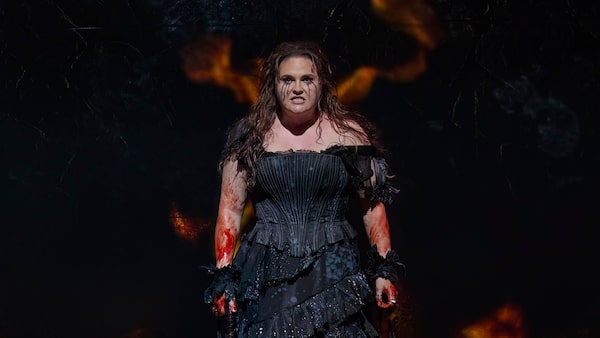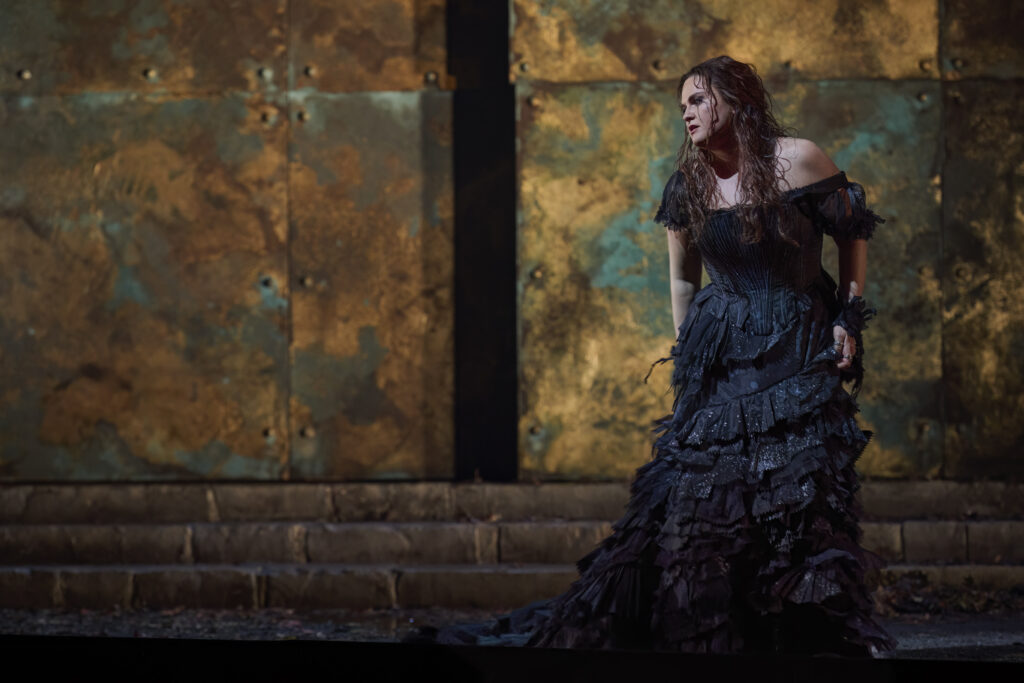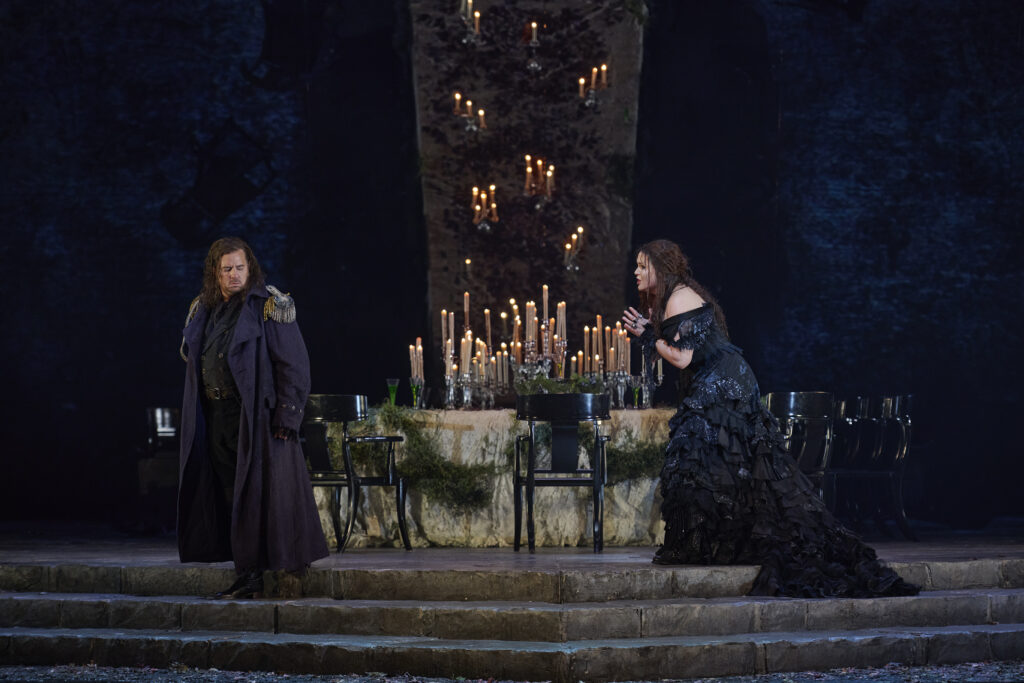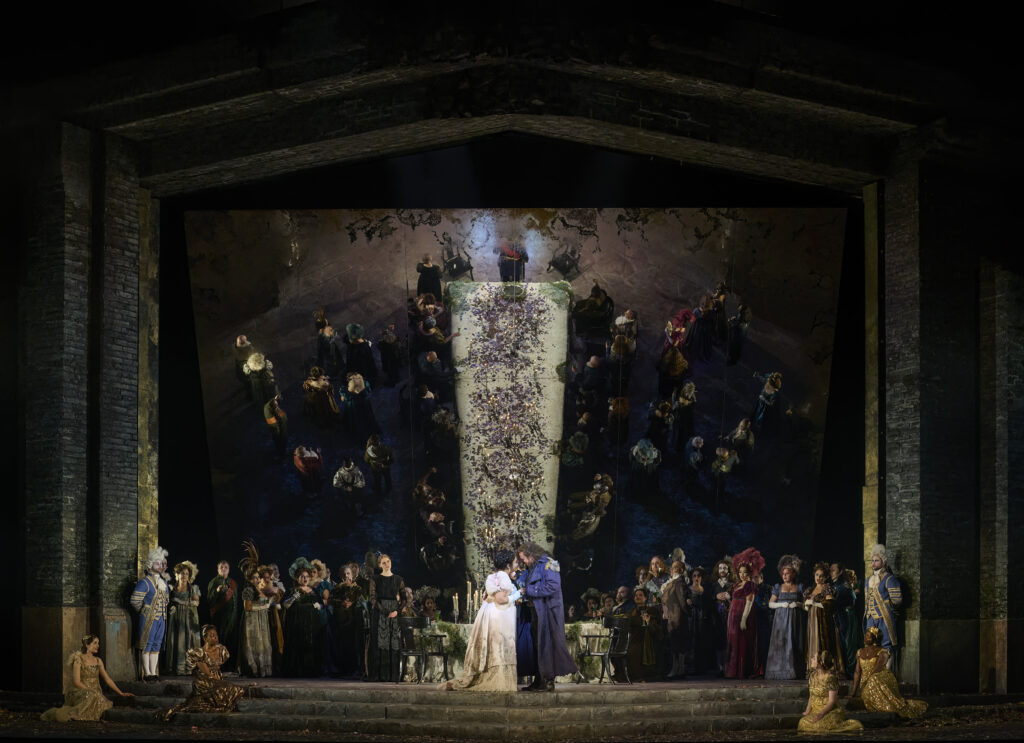

When COC general director Perryn Leech came on stage to announce that Sondra Radvanovsky would not be singing Medea, the audience expressed the usual disappointment. We were all, however, in for a genuine surprise. Italian soprano Chiara Isotton gave a spectacular performance, and the crowd went crazy for her. A star was born, at least in Toronto.
From the very first moment she stepped on stage, Isotton absolutely captured the spirit of the vengeful and conniving Medea. What a wonderful singing actor she turned out to be. The role is a complex one, in turn loving and submissive, moving through seductive and enticing, cajoling and begging, then raging. Performing Medea in this production is very physical as well. Director Sir David McVicar has her spend a lot of time on her knees, even crawling along the floor. She also gets thrown around a bit, but Isotton managed to gloriously sing her way through it all.
Isotton is a true spinto soprano, whose career embraces the heavier Verdi and Puccini heroines. It is a forceful voice, but one of exquisite colour – just as one would wish for in these roles. – a voice that can be manipulated and nuanced and controlled to express any emotion at will – powerful, yet beautiful, thrilling yet enticing. I even heard a Senta from time to time. Could Isotton do the Wagner opera heroines (not the music drama ones)? Perhaps – if she gets bored with the Toscas and Leonoras.
In fact, it was a cast of strong voices in every category which made for a most enjoyable performance. American soprano Janai Brugger (Glauce) and tenor Matthew Polenzani (Giasone) are repeating their roles originated at the Metropolitan Opera in 2022 of this COC co-production (the other two companies being the Greek National Opera and Lyric Opera of Chicago). Glauce is the lighter soprano role in relation to Medea, and Brugger sports a lovely lyric soprano, clear yet weighty. It is a pretty voice with heft. Polenzani has the required strength for the Verdi/Puccini heroes and he gave Giasone full throttle. He possesses a stirring spinto tenor. American bass-baritone Alfred Walker is a masterful Creonte – commanding and imposing by turns.

I was shocked to see American Zoie Reams (Neris) listed as a soprano, because I heard a hearty and fulsome mezzo-soprano. In fact, Neris has always been performed by a mezzo. The Met production featured Ekaterina Gubanova in the role, and research reveals that Fiorenza Cossotto and Teresa Berganza also played Neris, and you don’t get more mezzo-soprano than that. Reams’ resume includes other mezzo roles, yet she’s doing a Gilda in Chicago. Go figure. Nonetheless, she gives a very strong performance as Medea’s slave regardless which fach she is in.
Even the comprimario roles are extremely well sung by Canadian soprano Charlotte Siegel and mezzo-soprano Alex Hetherington as Glauce’s handmaidens, and bass-baritone Alex Halliday as the Captain of the Guard.
There are not enough words of praise to shower on Italian conductor Lorenzo Passerini making his COC debut. This production is meticulously rendered and magnificently defined. There is not one musical effect that is overlooked. In Passerini’s fine hands, Cherubini’s score becomes a musical conversation. The maestro is a keeper.
Which brings us to McVicar’s stage direction and set design. In the first case, I really appreciate his staging of Medea as if it were a play, with all the characters moving and emoting in naturalistic fashion. His set design, however, no matter how eye-catching, is overkill.
There is an overhead camera that projects this bird’s eye view onto the back cyclorama so we are seeing the stage both straight ahead and from above. It is a dazzling effect although a bit disorienting. MacVicar’s mistake was to use the overhead throughout. At one point, projections of clouds obscured the back wall, and it was almost a relief. If only MacVicar had used the overhead camera sparingly, and brought it out at key moments, such as Glauce’s and Giasone’s wedding, or Medea’s two little boys lying dead. Nonetheless, his idea of sliding doors that keep Medea downstage is a good idea that heightens her isolation. The production is also enhanced by Doey Lüthi’s attractive costumes, set in the Empire time of the opera’s creation.
This Medea is performed using the 1909 Italian version by Carlo Zangarini which has become the standard, but Medea is not an Italian opera. Cherubini wrote Medea in1797 in French with spoken dialogue as an opéra-comique. It is a French opera, and apparently it sounds and plays entirely differently in the original language, and all my reading indicates that for anyone who has experienced the original, it is the only way to go. Zangarini turned Medea into Verdi, when in fact it belongs in the Gluck school. That this Medea was not in the original French is my big disappointment of this production.

UPDATE: Other than opening night when Sondra Radvanovsky sang Medea, Chiara Isotton sang all the other performances after the former cancelled out of the run.
